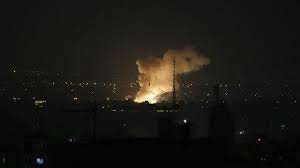
May 6, Israel: Israeli warplanes unleashed a wave of airstrikes on Yemen’s western Hodeidah province early Monday, killing at least two people and injuring 42 others.
According to the Hourthi-run health authorities. The strikes, which targeted key infrastructure, including Hodeidah’s port, airport, a cement factory, and military sites, mark a significant escalation in regional hostilities, a day after the Houthis militant group claimed responsibility for a missile strike near Israel’s Ben Gurion Airport.
Houthi-controlled Al-Masirah TV reported that Israeli forces carried out 48 airstrikes on the Red Sea province, damaging serious facilities in and around the port city. The port, which is an important entry point for humanitarian aid and commercial goods into Houthi-held territories, suffered severe damage. Residents said plumes of smoke blanketed the skyline, while cargo-handling facilities and several private factories sustained major destruction. Health officials have reported that the casualties included workers at the cement plant and civilians living in the Bajil district, northeast of the city.
The Israel Defense Forces (IDF) later confirmed the operation, stating that approximately 20 warplanes were involved in delivering 50 precision-guided munitions to “Houthi terror infrastructure” along Yemen’s western coastline. The military emphasized that the airstrikes, conducted over 1,700 kilometers from Israel, were a direct response to repeated Houthi attacks, including a recent missile strike near Tel Aviv.
Though the Houthis claim the United States and Israel jointly conducted the operation, the IDF made no mention of American involvement. However, separate reports from Al-Masirah and local sources indicated that at least 20 US airstrikes struck Houthi-controlled sites in the capital Sanaa, as well as the provinces of Marib and Al-Jawf on Monday. US Central Command has not stated on these reports at the time of publication.
The conflict spiked after the Houthis fired a missile on Sunday that landed near Ben Gurion Airport, wounding eight people and briefly halting air traffic. Israeli officials admitted their air defense systems failed to intercept the missile despite multiple interception attempts. In response, Israeli Prime Minister Benjamin Netanyahu vowed a forceful retaliation, extending his threats to the Houthis’ backers in Iran.
Houthi officials said their attack was a direct response to Israel’s ongoing military campaign in Gaza, stating the continued assaults on Israel and shipping lanes in the Red Sea until a ceasefire is reached and humanitarian access to Gaza is guaranteed. The group has increasingly framed its actions as part of a broader resistance movement in solidarity with Palestinians.
This fallout from the latest strikes in Hodeidha is already drawing concern from aid agencies. The port is a lifeline for millions in northern Yemen, where prolonged conflict and blockades have left populations. The humanitarian fallout from the latest strikes in Hodeidah is already drawing concern from aid agencies. The port is a lifeline for millions in northern Yemen, where prolonged conflict and blockades have left populations heavily reliant on international aid for food, medicine, and fuel. Further disruption could deepen the crisis in a region already on the brink of famine.
As tensions soar, the latest military exchanges signal a deepening of the regional proxy war, drawing in global powers and expanding the scope of conflict far beyond Gaza’s borders. The days ahead are likely to test the fragile geopolitical balance in the Middle East and put further strain on humanitarian operations in war-torn Yemen.
Moreover, Israeli Prime Minister Benjamin Netanyahu has promised firm retaliation. “There will be bangs,” he said, hinting at continued military operations against the Houthis. Netanyahu has promised retaliation on the same. “We operated against them in the past, and we will operate in the future,” he said.
Keep reading Questiqa.com for more news.




